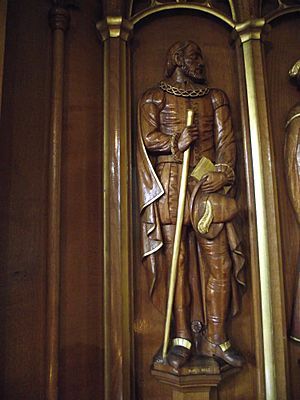James Bell (priest) facts for kids
Quick facts for kids BlessedJames Bell |
|
|---|---|

Statue of Blessed Fr. James Bell in St. Werburgh's Church, Birkenhead
|
|
| Martyr | |
| Born | 1520 Warrington, Lancashire, England |
| Died | 20 April 1584 (aged 63–64) Lancaster Castle, Lancaster, Lancashire, England |
| Venerated in | Roman Catholicism |
| Beatified | 15 December 1929, Rome by Pope Pius XI |
| Feast | 20 April; 4 May as one of the martyrs of the English Reformation |
| Attributes | Rod or cane, book of hours, hat |
James Bell (born 1524 – died 20 April 1584) was an English Catholic priest. He is known for being the only one of the Marian Priests who was executed for his faith. He is remembered as a Martyr in the Catholic Church.
Contents
Who Was James Bell?
James Bell was born in Warrington, Lancashire, England, in 1524. He went to Oxford University and became a priest during the time of Queen Mary.
His Journey of Faith
When Queen Elizabeth became queen, she made changes to the official religion in England. For a while, James Bell did not agree with these changes. But then, he decided to follow the new rules of the Church of England. He worked as a minister for about 20 years.
In 1581, something important happened. A Catholic lady helped him to return to the Catholic Church. He spent several months praying and studying. After this, he was allowed to work as a Catholic priest again. For two years, he worked hard helping Catholic families in Lancashire.
His Arrest and Trial
In January 1584, James Bell was traveling on foot. He asked for directions from a man who turned out to be a spy. This spy arrested Bell. He was first held in Salford Gaol.
Later, he was taken to Lancaster for his trial. He had to travel on horseback with his arms tied. His trial happened with another Catholic man, John Finch, and two other priests.
Facing Questions
On April 18, 1584, James Bell was questioned by judges. He was about 60 years old and had trouble hearing. Sometimes, he did not hear everything they said. The judges thought he was losing his courage.
The next day, they tried to scare him by describing how he would die. But James Bell remained strong.
His Brave Words
The judges asked if he had returned to the Catholic Church. He said yes. They told him this was considered a serious crime under the law at that time. But James Bell bravely said it was a holy act of repentance.
The court laughed at his words. James Bell then explained that he could forgive sins not by his own power, but because he was a priest.
He showed great courage. After being found guilty, he told the judge, "I beg your lordship, for the love of God, to add to the sentence that my lips and the tops of my fingers may be cut off for having sworn and subscribed to the articles of heretics, contrary both to my conscience and to God's truth."
His Last Moments
The night before his execution, James Bell spent time praying. He encouraged other prisoners to have faith. He then asked his friend, John Finch, to teach them more, as he felt weak due to his age and hardships.
On the morning of April 20, 1584, he was very calm. He said, "O blessed day, O the fairest day that I ever saw in my life." He refused help from an Anglican minister.
When he arrived at the execution place, he was forced to watch John Finch being executed. When he saw what happened to Finch, he said, "O why do I tarry so long behind my sweet brother; let me make haste after him. This is a most happy day." He then prayed for all Catholics and for others to convert.
James Bell was executed at Lancaster Castle on April 20, 1584. John Finch was executed at the same time and place.
Remembering James Bell
James Bell was one of 108 martyrs who were officially recognized by Pope Pius XI on December 15, 1929. This recognition is called beatification.
Where He Is Honored
Blessed James Bell is remembered in several places:
- There is a special plaque for martyrs in Lancaster Cathedral.
- He is shown in stained glass windows at St. Mary's Church, Warrington and the former Our Lady's Church in Latchford, Warrington.
- A statue of him can be found in the Lady Chapel of St. Werburgh's Church, Birkenhead.
- In Warrington, a building near the former St Benedict's Church was named 'Bell Hall' until the early 1990s.
- On May 1, 2018, three parishes in Warrington (St Mary's, St Benedict, and St. Oswald) joined together to form a new parish named after Blessed James Bell.
 | Selma Burke |
 | Pauline Powell Burns |
 | Frederick J. Brown |
 | Robert Blackburn |

